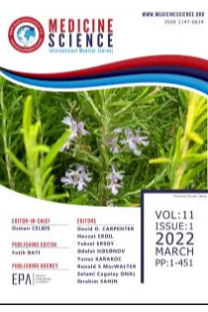The effect of conscientious intelligence on the ability to manage patient expectations: Example from a university hospital
___
Taşlıyan, M, Gök, S. Kamu ve Özel Hastanelerde Hasta Memnuniyeti: Kahramanmaraş’ta Bir Alan Çalışması. Kahramanmaraş Sütçü İmam Üniversitesi İktisadi ve İdari Bilimler Fakültesi Dergisi. 2012;2;69-94.Türk Dil Kurumu Türkçe Sözlük. Ankara, 2011:2465.
Dahlqvist V, Eriksson S, Glasberg AL. Development of The Perceptions of Conscience Questionnaire, Nursing Ethics. 2007;14:181-93.
Lützen K, Dahlqvist V, Erikssonn S, et al. Developing the Concept of Moral Sensitivity in Health Care Practice. Nursing Ethics. 2006;13:188-96.
Howard G., Zihin Çerçeveleri-Çoklu Zekâ Kuramı, (çev. Kılıç E.), Alfa Yayınları, İstanbul. 2010.
Gündüzözü, İ. Liderlik Kavramının İki Matrisli Analizi, Türk İdare Dergisi, 2013;477;192.
Jensen A. The Influence of Conscience in Nursing. Nursing Ethics, 2009;16 :31-42.
Jalali R, Hasani P, Abedsaeedi Z. Nurses’ Experience of The Perception of Nursing Conscience: A Phenomenological Study. İranian J Nursing Research. 2013;8:1-9.
10. Sorlie V, Kihlgren A, Kihlgren M. Meeting Ethical Challenges in Acute Nursing Care As Narrated By Registered Nurses. Nursing Ethics.2005;12:133-42.
11. Juthberg C, Eriksson S, Norberg A, et. al. Perceptions of conscience in relation to stress of conscience. Nursing Ethics. 2007;14:329-43.
12. Danah Z, Marshall I. SQ: Connecting with Our Spiritual Intelligence, Bloomsbury Publishing USA, 2000.
13. Aydıntan, B. Ruhsal Zekânın Dönüştürücü Liderlik Üzerine Etkisini Araştıran Uygulamalı Bir Çalışma. Atatürk Üniversitesi İktisadi ve İdari Bilimler Dergisi. 2009;23:259.
14. Juthberg C, Sundin K. Registered Nurses’ and Nurse Assistants’ Lived Experience of Troubled Conscience in Their Work in Elderly Care--A Phenomenological Hermeneutic Study. International J Nursing Studies. 2010;47:120–9.
15. Juthberg C, Eriksson S, Norberg A, et al. Perceptions of Conscience, Stress of Conscience and Burnout Among Nursing Staff in Residential Elder Care. J Advanced Nursing. 2010;66:1708-18.
16. Juthberg C, Eriksson S, Norberg A, et al. Stress of Conscience and Perceptions of Conscience in Relation to Burnout Among Care-Providers In Older People. J Clinical Nursing. 2008;17:1897-906.
17. Potter M, Gordon S, Hamer P. Identifying Physiotherapist and Patient Expectations in Private Practice Physiotherapy. Physiother Can. 2003;55:195202
18. Fuertes JN, Anand P, Haggerty G, et al. The Physician-Patient Working Alliance and Patient Psychological Attachment, Adherence, Outcome Expectations, and Satisfaction in A Sample of Rheumatology Patients. Behav Med. 2015;41:60- 8.
19. Miçooğulları A, Ayberk B, Akbaş U. Hasta beklentilerini yönetme becerisi ölçeğinin geliştirilmesi: geçerlik ve güvenirlik çalışması. J Exercise Therapy and Rehabilitation. 2017;4:76-81
20. Eskiyurt R, Özkan B. Hemşirelik Öğrencilerinin Kanser Hastalarına Yönelik Problem Çözme Eğitimi Sonrası Yaptıkları Psikososyal Müdahalelerinin İncelenmesi. The Journal of International Lingual, Social and Educational Sciences Year: 2017;3:316-22.
21. Beauchamp TL, Childress JF. Principles of Biomedical Ethics. Fourth Edition, New York: Oxford University Press. 1994:473-9.
22. Torjuul K, Elstad I, Sørlie V. Compassion and Responsibility in Surgical Care. Nursing Ethics. 2007;14:522-34.
23. Wilkes LM, Wallis MC. A Model of Professional Nurse Caring: Nursing Student’ Experience. JAdvanced Nursing.1998;27:582-9.
24. Shahriari M, Mohammad E, Fooladi MM. et al. Proposing Codes of Ethics for Iranian Nurses:A Mixed Methods Study. J Mixed Methods Research. 2015:1- 15.
25. Genius SJ, Lipp C. Ethical Diversity and The Role of Conscience in Clinical Medicine. International Journal of Family Medicine. 2013: 628-32.
26. Birchley G. A Clear Case for Conscience in Healthcare Practice. J Medical Ethics. 2012;38:13-7.
27. Glasberg AL, Eriksson S, Norberg A. Burnout and “stress of conscience” among healthcare personnel. JAdvanced Nursing. 2007;57:392.
28. Zyga S. Cultural conscience and nursing practice. International J Caring Science. 2011;4:1-2.
29. Aral V. İnsan ve Norm. İstanbul Üniversitesi Hukuk Fakültesi Mecmuası. 2014;172:1742.
30. Veatch RM. Biyoetiğin Temelleri. (Çev. Güven T.) 2. Baskı, İstanbul: HAYAD Yayınları. 2010:186-203.
31. Dünya Hekimler Birliği Tıp Etiği El kitabı. (Çev. Civaner M.) Ankara: Türk Tabipleri Birliği Yayınları. 2005:20.
32. Aktı Ü, Giderler C, Duran C, et al. Vicdani Zeka Ölçeği Geçerlilik ve Güvenirlilik Çalışması. İslami Medeniyeti Araştırmaları Dergisi. 2017;2:32949.
33. Kukla R. The Ontology and Temporality of Conscience. Continental Philosophy Review. 2002;35:1–34.
34. Staniuliene V. Conscience Among Care Professionals in Hospital Setting. Master Thesis School of Health Sience Bleking Health Institute of Technology, Sweden. 2005.
35. Roitman, JD. Emotional Intelligence: The Heart is Smarter than The Brain. University of Colorado.USA. 1999.
36. Çoban B, Karademir T, Açak M, et al. The Emotional Intelligence of Students Who are Sitting A Specialability Examination. Social Behavior and Personality. 2010;38:1123-34.
37. Arslan, I. Sağlık Çalışanlarında İş Yaşam Kalitesinin İş Performansı Üzerine Etkisinde Örgütsel Desteğin Aracılık Rolü, , Doktora Tezi, Okan üniversitesi, Istanbul. 2018.
38. Baltaş, A. Duygusal Zekâ Yeterlilikleri. 1999. Erişim tarihi: 12.05.2019, http://duygusalzekâ.com/.
39. Goleman, D. İş Başında Duygusal Zekâ. 2. Basım. Varlık Yayınları, İstanbul. 2000.
40. Yalçın, S.Ö., Hemşirelerin ve Hekimlerin Tıbbi Eylemlerinde Vicdanın Rolü: Bir Tutum Araştırması ile Birlikte, Doktora Tezi Çukurova Üniversitesi, Adana. 2016.
- ISSN: 2147-0634
- Yayın Aralığı: 4
- Başlangıç: 2012
- Yayıncı: Effect Publishing Agency ( EPA )
Deaths over 65 years of age alleged suicide
Ufuk AKIN, Mehmet YAVUZ, Mehmet TOKDEMİR
Protein losing enteropathy: A rare complication of ulcerative colitis
Sultan TÜREL, Ali KİRİK, Berkay KUSCU, Uğur ERGÜN, Mehmet Nur KAYA, Teoman DOGRU
Naci Omer ALAYUNT, Sercan TASGİN
Cengiz KOCAK, Sirin KUCUK, Ersoy ERCİHAN, Mehmet GUNDOGAN, Canan SAKAR, Asli Ucar UNCU, Bulent MİZRAK
Does bone mineral density change in polycystic ovarian syndrome?
Funda DİNC ELİBOL, Sezen Bozkurt KOSEOGLU
Evaluation of Bio-Rad D-10® and arkray adams HA-8160® HPLC analyzers in HbA1c measurement
ÖZGÜR MEHMET YİS, Mine Busra PEHLİVAN, Guler BUGDAYCİ, Neslihan YUCE
Evaluation of salivary alpha-amylase activity after stroke
Ayşe ÖZDEMİR, Rahsan ILİKCİ SAGKAN, Ali Yavuz KARAHAN, BANU ORDAHAN
Hatice KURNAZ, Gunnur DEMİRCAN, Ayyub EBRAHİMİ, Hande KOCAK
Determining nursing students’ evidence-based practice competencies and the effective factors
